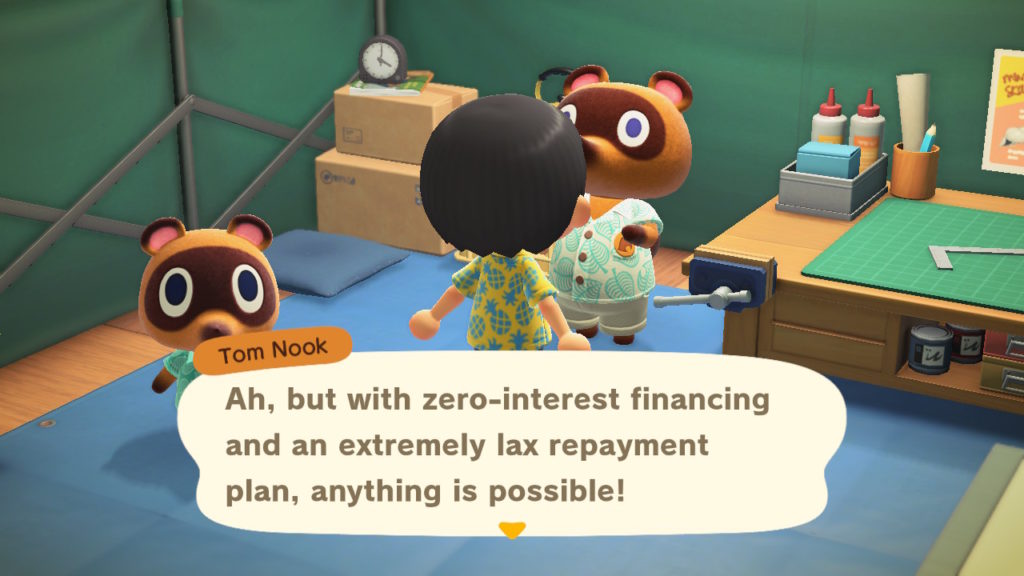This was originally written during COVID lockdown.
We live in unfortunate times, but Animal Crossing: New Horizons couldn’t have found a better release date.
In this social simulation game, you get to live on a deserted island where you get to spend your days with talking animal friends as your village neighbours.
By the way, if you’re familiar with the Sims or more recently Stardew Valley, Animal Crossing is a very similar kind of game where your character lives their best life.
It’s been very popular all around the world even more so because of the COVID-19 lockdown. Give it a try if you’re interested.
Animal Crossing is a very simple game which makes it very enjoyable and versatile. It’s really up to the player as to how they want to enjoy the game.
Fishing? Check. Gardening? Check. Paying your mortgage? Check. Dumping rubbish on a deserted island? Check. Wedding ceremony? Check. Stock market craze? Check.
We can all relate to Animal Crossing one way or another. Even marketers!
Not telling the entire truth is not lying
Ah, the deserted island getaway package! The package sold by Tom Nook, your tanuki (or raccoon, but it’s technically not the same animal…) tour operator, will help you get away from all your worries: work, stress, commute, capitalism… a dream life.
Your character gets ready to depart for your very own deserted island after you’ve completed all the formalities at the airport at the beginning of the game, and you’ll get to settle down very soon afterwards with Tom Nook, his two nephews, and two other adventurers who will become your first fellow islanders.
The all-inclusive package, as advertised, includes:
- airfare,
- accommodations,
- labour,
- tax,
- and a phone.
What you actually get from it:
- airfare (that’s fare enough),
- a tent and the land to plant it (it’s a deserted island, mind you, the idea of property shouldn’t exist),
- a DIY worktable you can borrow (where you are your own labour and have to make your own furniture and tools from material you’ve harvested yourself),
- the Nook tax (see below),
- a NookPhone™.
It sounds fair, but really, Tom Nook hasn’t been so honest because you’ll realise the all-inclusive package doesn’t include enough.
And you thought you were getting away from capitalism on your island.
Tom Nook IS capitalism.
But we don’t do things because they are easy, hm? We do them because they are profitable.*
*all quotes from Absolutely not Tom Nook are actually from the game, Animal Crossing: New Horizons
Creating the relationship
Tom Nook’s a clever businessraccoon. He knows how to make you depend on him… and you don’t really have a choice but to depend on him, because he’s the only person who can provide you with what you need.
He runs the only shop in the island, and selling your findings is the easiest way of making money.
Beyond their relationship with money and your need for Bells (the in-game currency, because yes, deserted islands need money after all), the Nooks are very knowledgeable when it comes to customer experience: first stop, getting you on board.
Onboarding: loyalty is just another currency
When you put your tent down, Tom will tell you about the cost of this operation… because you haven’t actually paid for the all-inclusive package just yet, he flew you on the deserted island first.
Bringing your grand total to the modest sum of 49,800 Bells.
Sum? Bells? Huh? No one said anything about cost!
It’s your itemized bill!
Tom’s got your back. Get your NookPhone™ out. Open the Nook Miles™ app and build up your Miles via their loyalty scheme.
By accomplishing various tasks on the island, you get to earn Nook Miles™… and your kindest tour operator tells you, as an exceptional one-time offer, the cost can be covered with your loyalty: you only need 5,000 Miles to pay for the all inclusive package.
Again, it’s a bit of an extreme example as it is a game after all, but it nails the onboarding process for a loyalty program.
If you need or are interested in the first thing you will get with your loyalty program, you will definitely find a use for it.
Although in the case of Tom Nook, it’s more of a monopoly… curse you, capitalistanuki!
You don’t really have a choice, since you already used his services… so you have to stick with it. It’s borderline shady really, but anything goes for your money loyalty.
But you know what? Now you are fully aware of the loyalty programme and the wonderful things it can get you. Smooth.
A few examples of good onboarding for loyalty schemes:
- Starbucks: A free drink for your birthday is all you get at first, but the more you buy, the more “valued” you are made to feel… it doesn’t cost them much, but it does get you to buy more increasingly.
- IKEA: It’s almost stapled everywhere in their shops, you get great benefits out of IKEA Family. They make it easy to register at their shops, and you don’t want to miss the benefits either. Win-win.
- Nike+: A free app for amateur runners? Great way to let the brand make a personal connection with their customers and encourage them to do sports… and buy more sportswear, hopefully from their brand.
Can you (up)sell me this tent?
It’s funny how cozy doesn’t always mean ‘Comfortable’, hm?
After settling down, Tom Nook will do his upselling pitch: how nice it would be to own a house on this island, and it’d be great for you to have more comfort, because the tent might start to feel a bit cramped. You could take on a mortgage to pay for your house too, no problem with Nook Finance™!

As a good salesraccoon, he will end his pitch with an offer you can hardly refuse because Nook is a very kind loan tanuki: he won’t take your Bells until you’re ready to pay. If only it were that easy in real life!
Upselling is a sales technique where a seller induces the customer to purchase more expensive items, upgrades or other add-ons in an attempt to make a more profitable sale. While it usually involves marketing more profitable services or products, it can be simply exposing the customer to other options that were perhaps not considered.
This whole process carries on for a while as Tom will find a way to tell you your house could be larger, or could do with an additional room, and he’ll naturally help you build it… never for free.
Think of it as a very extreme case of “room upgrade”, or meal supersizing. You technically don’t need any of these, but at least you know the option is there.
You can get material from all over the island by fishing, catching bugs, chopping wood, and you can then make money by selling what you harvest or collect to Nook’s nephews at 25% of the original price… hence the Nook Tax, and your hard-earned money will in turn help you pay back your mortgage.
Some of those who can upsell you a tent (and more):
- Any fast-food chain you can think of: Do you want to make it a large meal?
- Low-cost airlines: Are you an experienced yoga practitioner or do you want to pay for leg space? It’s barely more expensive than the ticket itself.
- Hotels around the world: Breakfast and mini-bars.
- Tom Nook.
This island is all yours
Now that everything’s said and done, you have paid for the package.
Great, but if you’re planning to live on this island, maybe we should give it a name. How about we all propose a name and we can cast our votes and choose the best sounding name?
Naturally, you, as the #1 customer, have the final word on the island name. It’s all yours.
My island is called “Purupuru”, by the way.
Now the island has a name, any future facility will bear the name of the island.
And now you gave the island a name… you’re the representative / mayor of the island.
You are now the most important resident on the island. Making you feel important is part of the journey. It makes you feel involved. You named the island, you have to take care of it.
You own the project, or the product, so you’re compelled to do something about it. Granting this sense of ownership makes your experience on the island very personal.
Less is more for later
However, there are a few obstacles to your life: for starter, you live on an island which has rivers and cliffs, and you probably think you’d need a bridge and a staircase to explore the island.
No, Tom Nook has a minimum viable product based mind:
- He gives you a tent and tells you you can upgrade it into a house at a cost.
- So you need to cross the river? Why not use a vaulting pole? Go make it yourself, get those materials, and run to the DIY corner.
- Do you want to climb up the cliff? You could make your own ladder too.
A minimum viable product (MVP) is a version of a product with just enough features to satisfy early customers and provide feedback for future product development.
By the way, once you progress a bit more in the game, he’ll let you know perhaps it’s time to build bridges to make it more welcoming for your future neighbours, which you may need to crowdfund…
In our real world, this would make perfect sense: would you build a bridge for one person? No, but you probably would consider building one once more people have a use for it.
Some products that went through puberty:
- Google: It was originally a website which simply helped looking for other websites. Now it’s an advertising platform, a shopping platform, an email provider, a GPS service provider…
- Amazon: From ordering books online to things we buy for literally no reason.
- Crowdfunded products: Products pitched on crowdfunding platforms only deliver as many features as the funding allows. More demand = more funds = more features on top of the core product.
From Minimum Viable Product to Most Valuable Player
As the island’s pioneer, you are to live with the minimum… only when the need arises, you are granted the privilege to decide the location for the very first bridge. You just have to make it yourself however because nothing is really free with Tom Nook, especially when it’s not essential.
No need to give everything away to your potential customers when they could pay for that one killer additional feature from your product… or make that one feature a premium!
It doesn’t work when you have competitors doing it better and/or cheaper.
But Tom Nook doesn’t have competitors.
As soon as you’re done with the first bridge, he’ll let you know you can now build more bridges and staircases at a cost. They are not a necessity at all, since you can still use your pole and your ladder. However, it does save a lot of time, so you may be more likely to invest in the paid premium solution.
That’s a good freemium model with little frustration.
Freemium, a portmanteau of the words “free” and “premium”, is a pricing strategy by which a product or service is provided free of charge, but money (a premium) is charged for additional features, services, or […] goods that expand the functionality of the free version of the software.
Some freemium which emphasise on the “mium” (and it works):
- Spotify/Deezer: The Minimum Viable Product is technically free, but it costs €10 a month to become a Most Valuable Player and remove the ads… worth it?
- Too many online and/or mobile games: You get to download the game for free, but how about enjoying it for a premium?
- WinRAR: Just kidding. They have always been the Most Valuable Players.
Animal Cross-selling
Enhance your island experience by inviting the animal friends you really want to live with. There’s an easy way to do that: with (real) money!
It’s not a feature limited to Animal Crossing, but rather to the whole Nintendo ecosystem which digs deep into the cross-selling potential.
Cross-selling is the action or practice of selling an additional product or service to an existing customer.
You can have the real all-inclusive package with amiibo, cute little figures (and cards in the case of Animal Crossing) you can buy in most shops. Use them to unlock additional features or to invite specific villagers.
Over 10 million amiibo figures were sold in the world in 2017. amiibo usually cost between $10-$30 in shops, so there’s quite a lot of money involved…
Non-animal cross-sellers:
- Most e-commerce websites: You must have seen these “You may also like” or “Related items” sections.
- Ikea: Came for the Swedish meatballs, stayed for Kallax and and Rimforsa.
- Airlines: Those legendary shopping catalogues on flights where you can buy things you don’t even know of, like that Cartier Watch that cost 10 times more than my Economy Seat. There must be people who buy this kind of stuff on a plane, but who?
Ready to wrap things up for now?
For marketers, there are many things to take away from a game, beyond sheer amusement. The reason being playing a game for the first time is very similar to trying a product or service for the first time.
Many people work to make a game great, and it starts from the very beginning: getting you hooked on the whole experience is their success, so there are countless hours of research behind the making of a game. The logic behind developing a product is not any different as companies hire UX experts to deliver the smoothest experience for their customers.
Naturally, not everything can be taken away as games remain a very unique kind of products, but there are definitely learnings that can be applied to other situations.
Before closing this post, I’d like to add that Animal Crossing is a lot about positivity, so while I may have been overly critical with Tom Nook, he’s a nice fellow, you can decide to pay him or not and he’ll never push you for anything.
Not strictly advisable from a business perspective, but quite generous. Yes, yes!
I hope everyone will find their own way to enjoy Animal Crossing!
Are you reinvigorated with the spirit of capitalism yet? Do you see how to generate more revenue for your business, or perhaps do you see how businesses generate more revenue from their marketing and sales tactics?
In any case, get your own turnip business running before they go bad. It’s almost Sunday 5AM after all.





